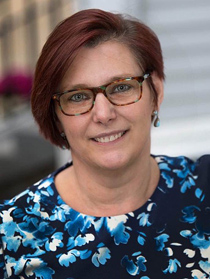
Faith
We have no problem talking about heart disease and cancer, we participate in walk-a-thons and ice-bucket challenges. It is time to do the same when it comes to mental health.

Wolfe
The death of Robin Williams is very, very sad. I suppose that's the irony of his death. A man who made us all laugh hard enough to cry, could not ultimately overcome his own sadness. It's not as if he never tried. The wildly talented comic known for his inexhaustible energy was very open about his struggles with both substance abuse and mental illness. I guess that's why most of us assumed that as bad as those problems could be -- Robin Williams would always be able to outrun them. In the end, he wasn't.
I think that is what's making Mr. Williams' death hit a lot of people considerably harder than they might have expected. Many have visited the L Street Tavern or left something at the Good Will Hunting bench. Those acts of kind remembrance reveal how very connected we want to be, and are, to each other. But they also reveal just how much we need to begin a constructive and ongoing conversation about mental health.
Those of us over 40 were raised in a culture of ignorance, and by that I mean that most of us did our best to ignore anything and everything to do with mental illness. People who were sad just needed to be cheered up. People who were traumatized were expected to pull themselves up by their bootstraps and get over it. Anyone who couldn't be cheered up or pulled up was somehow at fault. At best, they were considered societal deadweights with little to contribute. At worst, they were potentially dangerous and should be avoided, or institutionalized.
The under-40 crowd, on the other hand, is much more aware of depression, anxiety, and a wide array of eating and social disorders. They know something about how to recognize symptoms. They also feel much more comfortable about seeing a therapist or taking medication. But they don't seem to have much more success in addressing the causes or effects of mental illness, or in lifting the stigma from those who suffer from it. It has become easier and more acceptable to diagnose someone. But when we do, we tend to inadvertently equate a person with a problem. We often lose our grasp of the fact that while people have problems, no person is a problem. Everyone brings more to the human table than he or she takes from it.
The overwhelming majority of those who deal with mental illness go through life undiagnosed and untreated, largely because they believe that what they suffer is the result of their own personal failure. They are too embarrassed and ashamed to seek help for what they mistakenly believe they should be able to handle on their own. Their friends and families often find it easier to deny the problem or accept blame themselves. Others, overwhelmed, may simply give up and walk out.
We have no problem talking about heart disease and cancer, we participate in walk-a-thons and ice-bucket challenges. It is time to do the same when it comes to mental health. No community, no workplace, no school, no parish, and no family is immune from mental illness and its effects. Someone you know and even love is struggling with mental health issues. You -- and they -- may not even be aware of it. But it is important to affirm that you or he or she isn't a lesser person or a worse Christian because of it.
The suicide of Robin Williams reminds us that brilliant, creative, wealthy, active, talented, funny, successful, resilient people -- people who have much to offer -- suffer from mental illness. And yes, holy and virtuous people are not immune either. If we could start from that realization, we might be able to build a society in which mental health is viewed and treated the way physical health is.
God made each one of us a communion of body, mind and soul. In this world, we struggle with ailments that affect every part of us. All disorders are precisely that: things which disorder us and distort and compromise who God intended us to be. But in the place we're headed, God's intent is the way things are and the way we, too, will be. May all those who suffer, or who live with and love those who do, find peace.
JAYMIE STUART WOLFE IS A WIFE AND MOTHER OF EIGHT CHILDREN, AND A DISCIPLE OF THE SPIRITUALITY OF ST. FRANCIS DE SALES. SHE IS AN INSPIRATIONAL AUTHOR, SPEAKER, MUSICIAN AND SERVES AS AN ASSOCIATE CHILDREN'S EDITOR AT PAULINE BOOKS AND MEDIA.
- Jaymie Stuart Wolfe is a Catholic convert, wife, and mother of eight. Inspired by the spirituality of St. Francis de Sales, she is an author, speaker, and musician, and serves as a senior editor at Ave Maria Press. Find Jaymie on Facebook or follow her on Twitter @YouFeedThem.
Recent articles in the Faith & Family section
-
Scripture Reflection for April 21, 2024, Fourth Sunday of EasterJem Sullivan
-
The new Temple: How Easter changes religionDr. R. Jared Staudt
-
The wonder of Ordinary TimeLucia A. Silecchia
-
Is there still responsibility for past sins after confession?Jenna Marie Cooper
-
Wounds, not scarsJaymie Stuart Wolfe


















